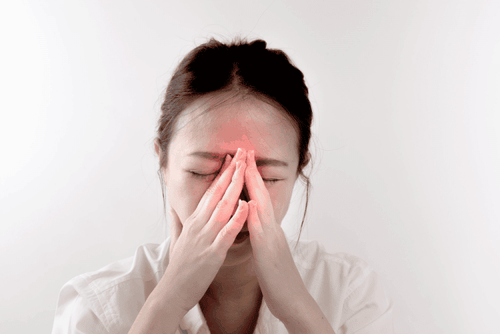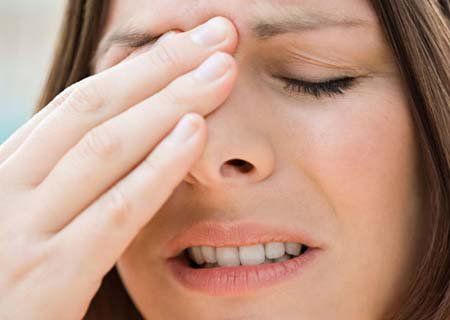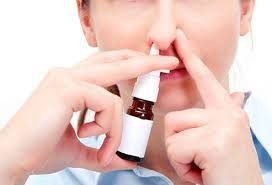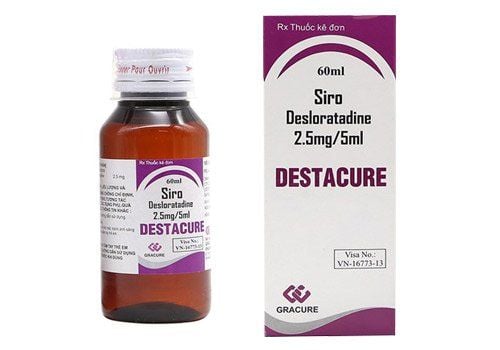This is an automatically translated article.
The cause of your year-round allergic rhinitis may be because you are allergic to a certain factor in the surrounding environment. Therefore, identifying the cause of the disease is a method to treat and prevent year-round allergic rhinitis.
1. What is perennial allergic rhinitis?
Allergic rhinitis is an inflammation and swelling of the nose caused by an allergy to a number of agents inside and outside the body (for example, dust, smoke, feathers, weather, temperature,...). This is a local manifestation in the nose because the nasal mucosa is sensitive to those pathogens and causes a hypersensitivity reaction.
Symptoms of allergic rhinitis include:
Runny nose, congestion, sneezing and sinus pressure. Nasal itching, stuffy nose Feeling tired, sluggish. Swollen, blue skin under the eyes. Decreased sensation or loss of smell or taste

Hắt hơi là triệu chứng bệnh viêm mũi dị ứng
When symptoms appear, at first it is just a natural protective response when the body is exposed to the allergen through inhalation. These are natural responses that help the body fight off and eliminate harmful agents faster. However, to a certain extent, this reaction is overblown and becomes dangerous. At that time, the disease causes many dangerous complications such as:
Sinusitis: If the nasal congestion persists due to inflammation, it will lead to infected and inflamed sinuses. Eye complications: Conjunctivitis, itchy eyes leading to vision impairment. Sleep disorders: Because the symptoms cause discomfort for the patient, it causes sleep disturbances. Asthma Ear Complications: Allergic rhinitis can lead to otitis media if not treated promptly. Respiratory complications: When patients with otitis media can cause deafness, pharyngitis...
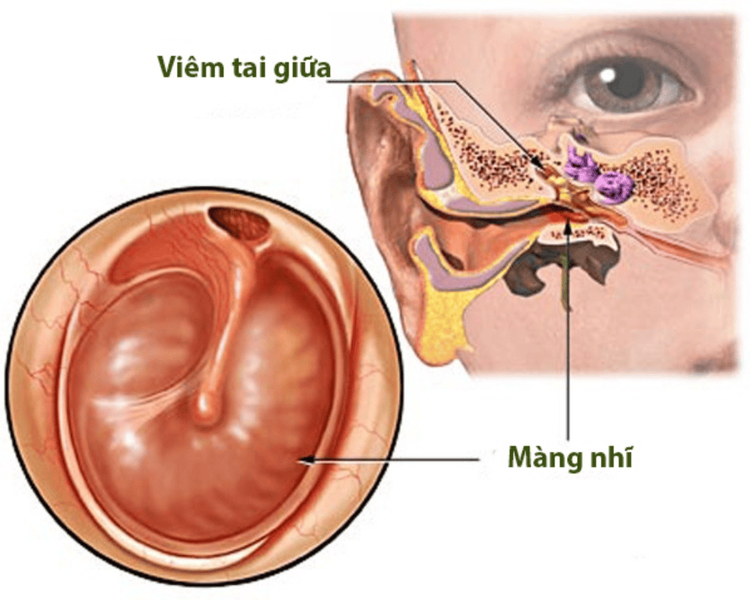
Viêm tai giữa do biến chứng viêm mũi dị ứng
2. Causes of year-round allergic rhinitis
Allergic rhinitis generally occurs when the immune system overreacts to an allergen present in the environment. When allergic rhinitis occurs only at a certain time of the year, it is called seasonal allergic rhinitis. So, if you have year-round allergic rhinitis, it could be caused by:
Allergies to animal fur and skin: Animal fur and skin have the potential to trigger allergic reactions and cause allergic rhinitis. year round for patients. Mold: Fungi can grow in humid places and cause allergy symptoms year-round, so many people who live in humid, poorly-ventilated environments are more likely to get allergic rhinitis. year round response. Dust mites: These are microscopic bugs found in the air. It will eat human skin cells and the air and then excrete feces and saliva. This irritates some people and causes year-round allergic rhinitis symptoms. Pathology: In addition, year-round allergic rhinitis may be related to a number of diseases (rhinitis, sinusitis...), drugs (such as Aspirin, anti-inflammatory drugs,...).
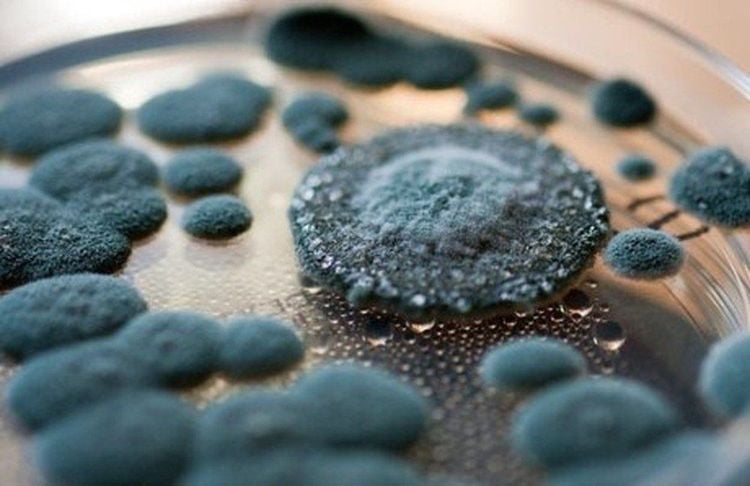
Nấm mốc gây viêm mũi dị ứng quanh năm
3. Treatment and prevention of year-round allergic rhinitis
3.1. Treatment of perennial allergic rhinitis The treatments for perennial allergic rhinitis are similar to those of seasonal allergic rhinitis. Specifically:
Drug treatment
Antihistamines: Over-the-counter antihistamines can treat allergy symptoms. Decongestants: Medicines such as Oxymetazoline, Phenylephrine are usually used for 3 days to relieve nasal congestion. However, do not use decongestants for a long time because they can damage the nasal mucosa. Steroid or Corticosteroid Nasal Sprays: Nasal sprays can relieve itching and other related symptoms. Steroid-type nasal sprays are often recommended for long-term management of the symptoms of allergic rhinitis. Corticosteroid nasal sprays are usually more effective, but long-term use can lead to nosebleeds and nasal pain. Medications to treat allergic rhinitis often come with some unwanted side effects. Therefore, sick people should talk to their doctor before using medicines to treat allergic rhinitis.
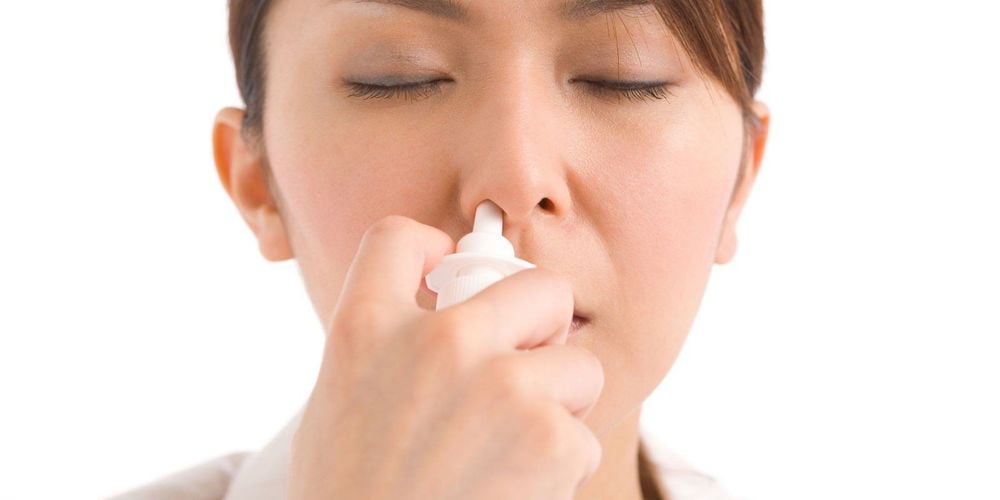
Sử dụng thuốc xịt mũi điều trị bệnh
Immunotherapy:
Immunotherapy is indicated for the following cases: unavoidable allergens; medication cannot control symptoms; Allergic rhinitis affects the quality of life of patients. Immunotherapy is usually treated over the course of 3 to 5 years. Therefore, people with the disease can apply immunotherapy along with anti-allergic drugs to treat symptoms that cause allergic rhinitis.
Sublingual immunotherapy:
This therapy takes a small pill containing a mixture of allergens and then placed under the tongue. This medication will be effective in the treatment of year-round allergic rhinitis, asthma caused by pollen, animal dander and dust mite allergies. However, when using this therapy, patients may experience some side effects such as itchy mouth, irritation of the throat and ears. In some more severe cases, the person may go into anaphylactic shock. 3.2. Preventing Allergic Rhinitis Year-round The best way to prevent allergic rhinitis symptoms year-round is to avoid allergens such as:
If you have a pet in the house, bathe it regularly. Keep your pet away from his bedroom, bed and personal items. The living place must be well ventilated, avoiding humid and moldy environments. Use a dehumidifier and clean the house and bedroom regularly. Prevent dust mites by washing items in your home. Vacuum at places where you live and work regularly. Avoid insects, especially cockroaches; Always cover the trash, clean dishes and food debris to avoid creating conditions for insects to multiply and develop. Remove dusty objects such as books, newspapers, ....

Hút bụi vệ sinh sạch sẽ nơi ở giúp phòng bệnh
If in case the patient does not find the allergen, see a specialist so that the doctor can do tests and tests to confirm the cause of the allergy all year round.
To register for examination and treatment at Vinmec International General Hospital, you can contact Vinmec Health System nationwide, or register online HERE
MORE:
Seasonal changes, vigilance Allergic Rhinitis Attacks Allergic rhinitis is easily confused with sinusitis Treatments for allergic rhinitis




